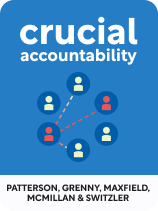

This article is an excerpt from the Shortform book guide to "Crucial Accountability" by Kerry Patterson, Joseph Grenny, et al.. Shortform has the world's best summaries and analyses of books you should be reading.
Like this article? Sign up for a free trial here .
What are the biggest factors affecting motivation? How can you identify them?
According to the book Crucial Accountability, the three main factors affecting motivation are: personal, social, and structural. The authors present three questions you should ask yourself before making assumptions as to why somebody lacks motivation.
Keep reading for a more detailed explanation of factors affecting motivation.
Factors Affecting Motivation
To avoid making the fundamental attribution error, we must try to see all the possible reasons why the other person broke our expectations. The authors assert that there are two primary reasons why people fail to meet expectations: They are either unmotivated or unable.
They further explain that there are three factors affecting motivation and ability:
- Personal: how inherently willing or able we are to complete the task
- Social: the influence of others on our motivation or ability
- Structural: the impact of our external environment on motivation or ability
Thus, to understand all possible reasons why the other person let us down, we must consider the personal, social, and structural factors that influence motivation and ability.
(Shortform note: In this section, the authors warn us not to enter a conversation with mistaken assumptions. In The Four Agreements, Don Miguel Ruiz similarly cautions against making wrong assumptions and explains how they can lead to a cycle of conflict: Assumptions lead to misunderstandings, which cause us to be offended, at which point we lash back, which creates more negativity and leads the other person to treat us badly again. Thus, when we make negative assumptions, we can both damage our relationship with the other person and leave the original issue unsolved.)
How to Consider Factors Affecting Motivation
When considering the personal, social, and structural factors affecting motivation, the authors suggest asking the following questions:
When considering personal motivation, ask: Is this person intrinsically motivated to complete the task, keep the promise, or uphold the commitment they made to us? Do they enjoy this action, or is this action taxing for them? However, the authors caution that only considering personal factors is the root cause of fundamental attribution error.
(Shortform note: Psychologists explain that intrinsic motivation is motivation that’s driven by internal rewards, like meeting a personal goal. Extrinsic motivation, on the other hand, is driven by the desire for external rewards, like money or gratification, or the fear of consequences.)
When considering social motivation, ask: Could the other person’s motivation be influenced by anyone else? Consider the impact of friends, family, customers, bosses, or coworkers. Were they peer pressured to put a task off or asked by someone to put another task first? Finally, consider your role in the social formula—is it possible that the way you made your request to this person came across as rude, and that’s why they did not follow through?
| Peer Pressure Among Adults While most people think the forces of peer pressure largely disappear once we grow up, psychologists note that this is far from accurate. In fact, our friends and family have a huge impact on the decisions we make. So, how can we free ourselves from the grips of peer pressure? 1. Reflect on your core values. If your actions or behaviors don’t represent these values, change them. 2. Be assertive with peers by using “I” phrases such as “I want,” or “I think.” 3. Develop relationships with a wide demographic of people. 4. Seek advice from people who affirm your values. |
When considering structural factors, ask: How might external elements like money, data, work space, equipment, or even temperature be impacting the person’s motivation? Are they being underpaid for the job being asked? Is it difficult for them to acquire the time or resources necessary to complete the task? Is there a more financially motivating task that they’re choosing to complete first?(Shortform note: Experts second the authors’ argument that external factors of the work environment like lighting, temperature, air quality, and noise can impact motivation. They note specifically that open open-plan offices, temperatures above 25℃, and frequent noises like phones, keyboards, and copiers, can dramatically decrease motivation and productivity in employees.)

———End of Preview———
Like what you just read? Read the rest of the world's best book summary and analysis of Kerry Patterson, Joseph Grenny, et al.'s "Crucial Accountability" at Shortform .
Here's what you'll find in our full Crucial Accountability summary :
- How to broach sensitive conversations with loved ones and coworkers
- How to prepare for, execute, and follow up on accountability conversations
- How to solve issues while improving your relationships






